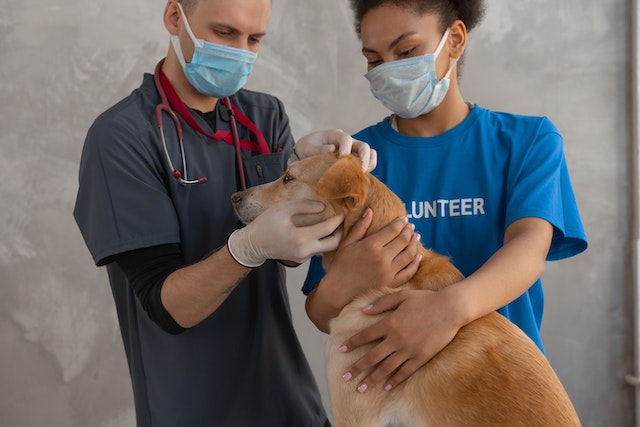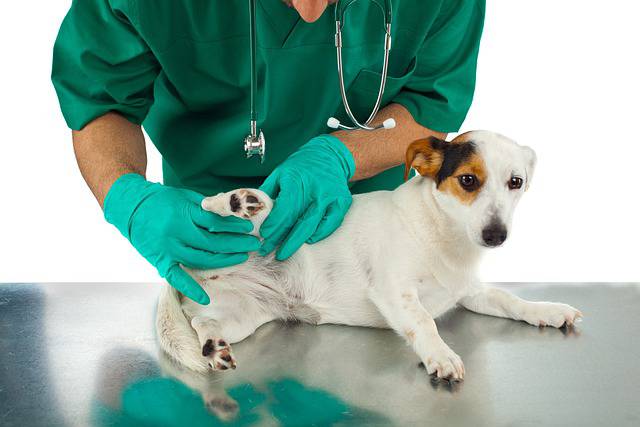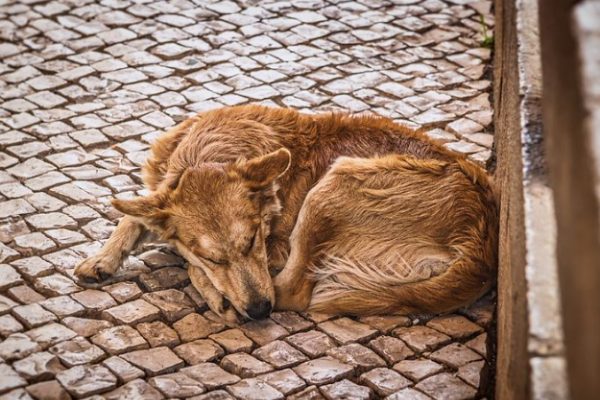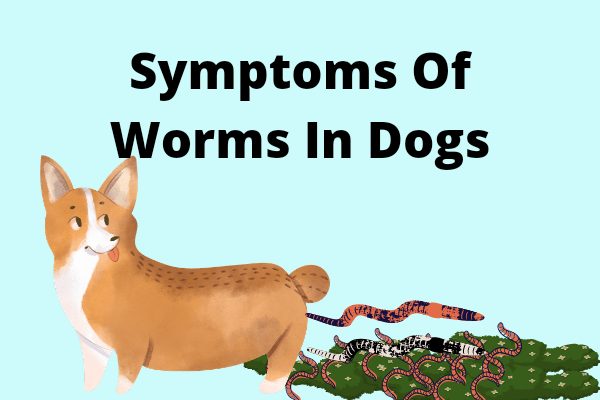11 Potential Reasons Your Dog Poops Liquid Blood
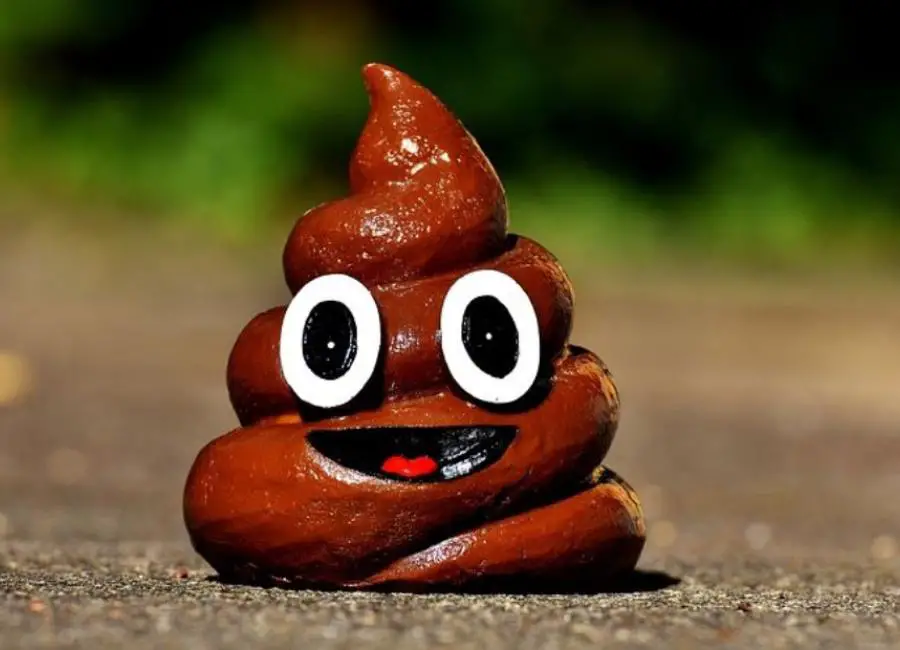
Are you worried about your furry friend’s well-being? Seeing your dog poop liquid blood can be a scary sight, but don’t panic just yet.
Before rushing to conclusions or trying to diagnose the cause on your own, it is important to understand the potential reasons and when to seek medical attention.
In this short blog post, we’ll give you a rundown on some possible factors that may be causing your dog to poop liquid blood and what steps you can take to help your pup feel better.
Understanding Hemorrhagic Gastroenteritis in Dogs
Hemorrhagic gastroenteritis (HGE) is a disorder that affects dogs, causing symptoms such as vomiting and bloody diarrhea.
It is characterized by a sudden onset of symptoms and can cause dehydration and other serious health problems if left untreated.
HGE can affect dogs of any age, breed, or gender, but it is most common in small-breed dogs.
Some of the symptoms of HGE include vomiting, diarrhea, dehydration, lethargy, and abdominal pain.
The exact cause of HGE is unknown, but it is thought to be caused by a combination of factors, including stress, diet, immune system disorders, and bacterial or viral infections.
Treatment for HGE usually involves hospitalization, fluid therapy, and medication to control vomiting and diarrhea.
In severe cases, blood transfusions or other interventions may be necessary.
If you suspect that your dog may have HGE, it is important to seek veterinary care immediately to prevent serious complications.
Potential Reasons Why Your Dog Poops Liquid Blood
Here are some potential reasons why your dog poops liquid blood:
1. Hemorrhagic gastroenteritis (HGE)
Just like we explained above, HGE is a sudden, serious condition that can make dogs vomit, have bloody diarrhea, and get dehydrated.
HGE has no recognized cause, however, it may be brought on by stress, bacteria, or toxins.
Supportive care, such as fluid therapy, is used during treatment to control electrolyte imbalances and dehydration.
2. Inflammatory bowel disease (IBD)
This is a chronic illness that results in inflammation and bloody diarrhea when the immune system attacks the lining of the colon.
Although the precise origin of IBD is not fully understood, it is believed to be connected to an aberrant immune response to the intestinal flora.
Diarrhea, vomiting, weight loss, and decreased appetite are just a few symptoms.
IBD is normally treated with a regimen of medication, dietary control, and supportive care.
In addition to suggesting a particular diet, your veterinarian may prescribe medicine to lower inflammation and control the immune system.
3. Parasites
Intestinal parasites like coccidia, whipworms, and hookworms can make dogs’ diarrhea bloody.
These parasites cause bleeding and inflammation when they attach to the gut lining.
Diarrhea, weight loss, and a bad coat condition are examples of symptoms.
Ingestion of infected prey or contact with contaminated soil is two ways that parasites can spread.
Most commonly, a veterinarian may prescribe deworming medication to treat intestinal parasites.
To avoid re-infection, it’s critical to adhere to the recommended treatment schedule and practice proper cleanliness.
Learn more about dog pooping worms after deworming.
4. Infections
Bloody diarrhea can result from bacterial, viral, and fungal diseases that inflame and damage the lining of the intestine.
Numerous bacteria, including Salmonella, Campylobacter, and E. coli, are capable of causing these diseases. Fever, vomiting, and diarrhea are possible symptoms.
Contact with polluted food or water, diseased animals, or both are ways that infections can spread.
Whether an illness is bacterial, viral, or fungal will determine the appropriate course of treatment.
In addition to supportive therapy including fluids and anti-nausea medicine, your veterinarian may recommend antibiotics or antifungal medication.
5. Dietary indiscretion
Consuming expired food, trash, or fatty human food can make dogs have bloody diarrhea.
When you give your dog a food that they are not used to or make a sudden shift in their diet, this can happen.
Diarrhea, vomiting, and abdominal pain are possible symptoms.
It’s critical to eliminate the offending food or substance from your dog’s diet if they have bloody diarrhea as a result of a dietary error.
Additionally, you might need to give supportive treatment such fluids and anti-diarrhea medicines.
6. Food allergies or sensitivities
Your dog may experience an adverse reaction to some food ingredients, leading to bloody diarrhea.
This may be brought on by a sensitivity to a food additive or an allergy to a particular protein or component in your dog’s diet.
Itching, diarrhea, and vomiting are possible symptoms.
Your veterinarian may advise a hypoallergenic diet or an elimination diet if your dog is having an allergic reaction to their food in order to identify the offending element.
If the condition is severe, your veterinarian could recommend medication to treat symptoms like inflammation or itching.
7. Cancer
Dogs who have certain cancers, such as intestinal lymphoma, may experience bloody diarrhea.
Bloody diarrhea may result from digestive tract bleeding brought on by cancer.
It is significant to remember that this symptom might occasionally be caused by cancer.
Lethargy, vomiting, diarrhea, and weight loss are possible symptoms.
The type and location of the cancer will determine the course of treatment for canine cancer.
Options for managing symptoms may include surgery, chemotherapy, radiation therapy, and supportive care.
8. Medications
Antibiotics and nonsteroidal anti-inflammatory drugs (NSAIDs) are two examples of drugs that might irritate and bleed in the digestive tract.
These drugs may alter the healthy bacterial balance in the colon, causing inflammation and bleeding.
Lethargy, vomiting, and diarrhea are among symptoms that can occur.
Your veterinarian may change the prescription or reduce the dosage if your dog develops bloody diarrhea as a side effect of medication.
It’s crucial to continue taking the medication as directed and to heed your veterinarian’s advice.
9. Systemic disease
Dogs can develop bloody diarrhea from illnesses that involve many organs, such as kidney or liver disease.
Numerous symptoms, such as tiredness, loss of appetite, and weight loss, might be brought on by these illnesses.
Diarrhea, vomiting, and abdominal pain are possible symptoms.
Depending on the exact illness, treatment for systemic disorders like kidney or liver disease may combine medication, dietary modification, and supportive care to control symptoms.
10. Trauma
It is possible for the digestive tract to bleed if your dog swallowed something pointy or sustained an abdominal injury.
This can cause a variety of symptoms, including bloody diarrhea. Diarrhea, vomiting, and abdominal pain are possible symptoms.
It is crucial to seek veterinarian care right away if your dog has a serious injury or has ingested anything sharp.
Surgery to remove the item or fix abdominal damage may be required as part of the treatment.
11. Blood clotting disorders
The ability of the dog to make blood clots can be compromised by illnesses such Von Willebrand disease and hemophilia, which can result in excessive bleeding.
Other signs of blood clotting issues in dogs include bleeding from the gums or nose, bruising easily, and lethargic behavior.
Medication to control bleeding and avoid blood clots may be part of the treatment for blood clotting problems.
Dogs with blood clotting abnormalities might need to be treated and monitored for the rest of their lives.
Diagnosis of Dog Pooping Liquid Blood
If you suspect that your dog is pooping liquid blood, it’s important to take them to a veterinarian as soon as possible for an accurate diagnosis and treatment.
This could be a symptom of a serious medical condition such as hemorrhagic gastroenteritis, which can be life-threatening if left untreated.
There are two types of bloody stool to look out for when your dog is experiencing diarrhea:
Hematochezia is caused by bleeding in the lower digestive tract or colon, and it is bright red, and Melena is the blood that has been digested or swallowed.
The veterinarian will likely perform a physical examination of the dog, collect a stool sample, and run tests to determine the underlying cause of the bloody stool.
Treatment will depend on the cause of bloody diarrhea but may include medications, dietary changes, and fluid therapy.
It’s important to follow the veterinarian’s instructions and monitor your dog closely for any changes in their condition.
Treatment Options for Dog Pooping Liquid Blood
Bloody diarrhea in dogs can be a serious condition and may require medical intervention.
The course of treatment prescribed for your dog will depend on the underlying cause of the problem.
Some possible treatments include:
- A change in diet
- Fluids to treat dehydration
- Antibiotics to treat underlying infections
- Anti-parasitic treatments
- Probiotics
- Antacids
- Anti-inflammatory drugs
- Surgery in severe cases
However, it is important to note that the specific treatment plan will depend on the underlying cause of your dog’s condition, and should be determined by a licensed veterinarian.
Home remedies for bloody diarrhea in dogs are not recommended as they can worsen the condition and cause further complications.
Learn more about dead worms in dog poop.
Prevention of Dog Pooping Liquid Blood
If you see blood in your dog’s feces while they are having diarrhea, that is one of the most alarming indications that something is wrong.
Here are a few methods to prevent dogs from passing bloody feces:
- Ensure that your dog has access to clean, fresh water at all times. Dehydration can be a contributing factor to diarrhea and bloody stools.
- Try to avoid exposing your dog to contaminated water sources. If you are unsure about the quality of water, it is best to give your dog bottled or purified water.
- Consider using parasite-preventive medications as recommended by your veterinarian. Parasites can be transmitted through contaminated water or contact with other infected animals.
- Practice good hand hygiene to prevent the transmission of zoonotic diseases, which can be spread between animals and people.
- Avoid feeding your dog foods that they are not accustomed to, as this can cause gastrointestinal upset.
- Use caution when introducing new treats or foods into your dog’s diet. It is always best to introduce new items gradually to prevent digestive upset.
- Keep your dog’s vaccinations up to date to prevent the transmission of infectious diseases.
- Maintain regular veterinary exams to monitor your dog’s overall health and catch any potential health issues early.
- When in doubt, seek veterinary care for your dog if you notice any changes in their bowel movements, appetite, or overall health. Early treatment can help prevent more serious health complications from developing.
Learn more about a dog not eating but throwing up.
Common questions
Why is my dog pooping liquid blood?
There are many potential reasons for a dog to poop liquid blood, including infections, parasites, inflammation, and diseases such as cancer.
It could also be a symptom of an underlying condition. If this persists, it’s best to consult your vet right away.
Is it normal for a dog to poop blood?
No, it’s not normal for a dog to poop blood. It could be caused by various reasons and needs to be addressed immediately by a veterinarian.
Learn more about your dog drinking a lot of water and not eating.
What are the symptoms of a dog pooping liquid blood?
Symptoms include weakness, lethargy, vomiting, diarrhea, weight loss, and loss of appetite.
If you notice any of these symptoms in your dog, you should contact your vet right away.
How is liquid blood in dog poop treated?
Treatment depends on the underlying cause of the dog pooping liquid blood.
Your vet will need to diagnose the root cause and treat it accordingly. Treatment may include antibiotics, parasite medication, surgery, or more.
Learn more about dogs coughing and not eating.
Can a dog’s diet cause liquid blood in poop?
While it’s possible that your dog’s diet might cause a minor digestive upset, it’s highly unlikely that diet alone will cause liquid blood in poop.
If your dog is experiencing this symptom, it’s best to consult with a veterinarian.
What should I do if my dog is pooping liquid blood?
The first thing you should do is contact your veterinarian right away.
They can diagnose and treat the underlying condition causing the symptom.
Recognizing and addressing it early can help prevent more serious complications.
Learn more about the benefits of vaccinations for dogs.
Conclusion
In conclusion, if your dog is pooping liquid blood, it’s important to take action quickly.
While it may be a sign of something minor, it could also be a symptom of a more serious condition.
Keep an eye on your dog’s behavior and take them to the vet as soon as possible.


